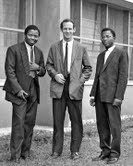Where Were You When John F. Kennedy was Shot? Roger Landrum (Nigeria 1961-63) Remembers

JFK and Sarge and First PCVs in the Rose Garden, 1961
I was on a Peace Corps recruiting blitz at University of Pennsylvania sitting at a table in the student union handing out brochures for “the toughest job you’ll ever love,” jawboning students to take the plunge, having just returned from two years as a PCV in Nigeria. Word of JFK’s assassination circulated through the union with a shocked buzz. The sudden death of our young president seemed unreal. The recruiting team immediately headed back to DC by van. At the recruiting table with us was a relative of LBJ, who had been foisted on the PC staff. I thought she was going to break a leg in her rush to get back to Washington.
Peace Corps headquarters, then across Lafayette Park from the White House, was a stricken place. Everyone, including me, felt like royalty had been assassinated. Many early PCVs shared the feeling that JFK had personally empowered us, after the conformist 1950s, to represent our country abroad, and liberated us from a stifling career grind to follow new paths and, yes, find new frontiers. That night I sat in my apartment reading Whitman’s “When Lilacs Last in the Dooryard Bloomed” with tears streaming. A couple days later I watched the funeral procession on upper Connecticut Avenue from the Miatico building that housed Peace Corps headquarters: the riderless horse Black Jack, with backwards-pointing boots in the stirrups; the sound of muffled drums in the November air. Jacqueline. Robert, and Teddy Kennedy walking side by side, Sarge a step behind, Haile Selassie, Charles DeGaulle and other heads of state behind them in a procession to the Funeral Mass at St. Matthew’s Cathedral. It was simple, stark, and powerful.
Life went on. The country had been pointed in new directions. The full brilliance of the civil rights movements and the eruption of the 60s cultural revolution lay ahead. The Peace Corps continued to expand, for awhile. But something vital had been abruptly ended.
•
Roger Landrum (Nigeria 1961-63) taught at the new University of Nigeria at Nsukka in Nigeria’s first year of independence. His experience was the subject of a Peace Corps documentary film called “Give Me A Riddle.” He was one of the first RPCVs to join the PC/W staff.

Roger with students at Nsukka, Nigeria
Landrum devoted most of his subsequent career to expanding youth service opportunities in the US. In the late 60s he founded The Teachers Inc. providing Peace Corps-like teachers for American inner-city schools. In 1979 Landrum co-authored “Youth and the Needs of the Nation” with Harris Wofford, a policy blueprint for a large-scale nonmilitary national service initiative. In 1986, with support from Ford Foundation, Landrum launched Youth Service America (YSA) which organized and expanded a national movement to develop youth service programming and policies in states and nationally. He advised foundations, Congress and two presidencies on ways to support and develop the new field, culminating in the National and Community Service Acts of 1990 and 1993 and creation of the federal Corporation for National Service along with AmeriCorps.
As president of RPCV/W, the largest local organization of RPCVs in the country, Landrum led the Peace Corps alumni coalition that organized the famous 25th Peace Corps Anniversary Conference in Washington in 1986. The conference brought new momentum and funding to restart the NPCA which Landrum later served as board chair.
It is said , “something vital was abruptly ended.” However, Roger and others pressed on. Carrying the message, and as Sarge said.–.serve, serve, serve! Roger continued to serve as an example to the rest of us. The attempts on defeating the ACA are just a reminder the work is not yet finished. Thanks, Roger